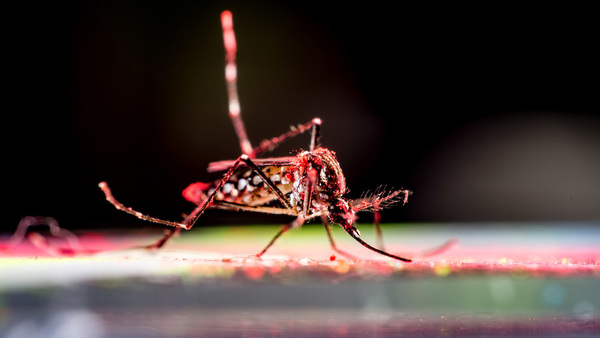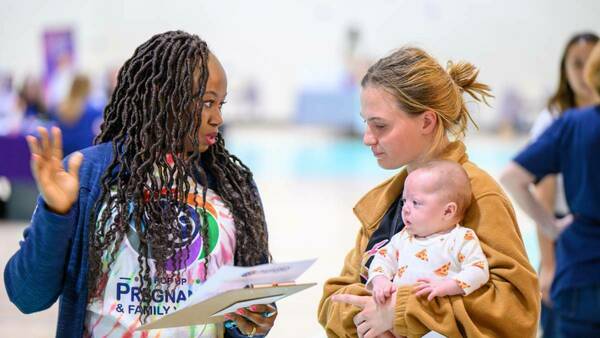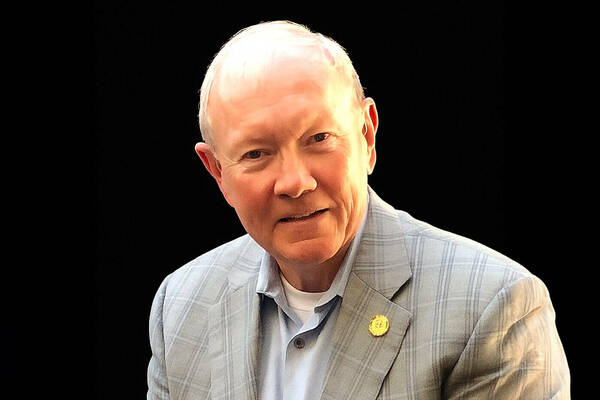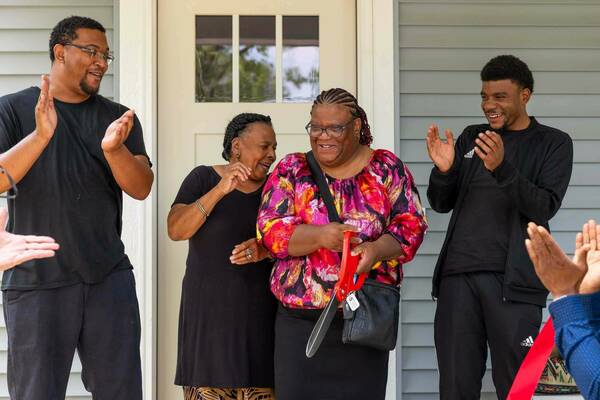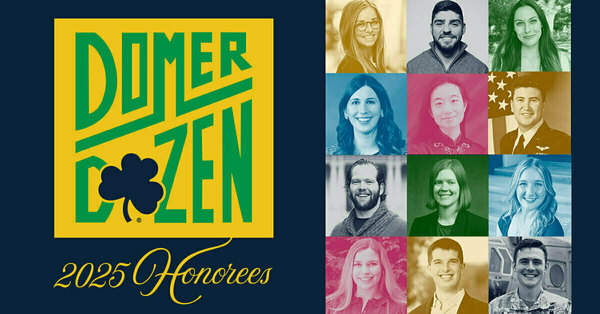Labor economist seeks to understand how society continues to innovate — and why relationships are key to progress
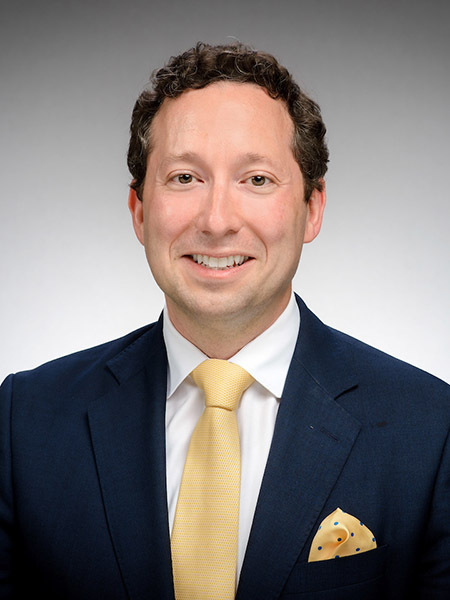
Kirk Doran has always been fascinated by the development of new knowledge.
Growing up in an academic family, Doran was surrounded by people who had deep discussions on topics such as political science, mathematics and the history of science. He later became inspired by Nobel Prize-winner Paul Romer and his research on what causes long-term per capita economic growth.
“What he discovered is that, whatever causes long-term per capita economic growth, it must be something that is so deeply non-rival that everybody can use it at the same time, without there being any less of it,” Doran said. “And the only thing like that is knowledge.”
From then on, Doran’s research mission has been to identify where and how new knowledge is created.
Doran, an associate professor in the Department of Economics at the University of Notre Dame, is one of four finalists from leading global institutions for the 2024 Adam Smith Panmure House Prize.
Established in 2021, the prize is named after the forefather of economics and celebrates those who embody his empiricism and long-term interdisciplinary thinking in their research. It has been given to emerging academic leaders across multiple disciplines, including a business academic, a neurologist and an anthropologist.
“I feel really honored, and I am inspired by the work the previous winners did,” Doran said. “It’s a young prize, and it already highlights really important research in this area.”
Examining productivity and innovation
Like Smith, Doran focuses his research on asking fundamental questions that are often hard to find a definitive answer to because they are so overreaching.
In his subfield of innovation economics, Doran aims to use techniques developed by modern labor economists to answer questions that had been long debated without progress until these techniques were developed. What determines people’s wages? How much more or less will people work if wages increase by 10 percent? What is the long-term economic impact of immigration?
“Those questions were so fraught that labor economists developed the best empirical techniques in those areas in order to finally make progress. When I became an economist, these hadn’t been applied yet to innovation economics,” Doran said. “So it took me a couple of years after I left Princeton (as a graduate and doctoral student) for Notre Dame to really have the courage to dive into this.”
Collaborating with peers such as Harvard University economist George Borjas, Doran has applied empirical tactics to measure knowledge generation through bibliometric analysis of interdisciplinary databases — such as papers, patents and medical trials — that are often hard to collect and define cohesively.
Taken together, his studies find that the development of new knowledge is ultimately based on collaborative relationships in which people inspire and challenge one another.
“The only way that you can get a true expansion in knowledge production — one that doesn’t crowd out other peoples’ knowledge production and create a zero-sum game — is if you’re collaborating really deeply with other new knowledge producers,” Doran said.
The question of how new knowledge evolves is particularly important in today’s world as evidence has shown that innovation and productivity are getting harder to achieve.
“There are more hours necessary for such innovation now than there were 30 years ago, or 60 years ago, or 100 years ago,” Doran said. “The good news is that there are ways of producing new knowledge that are better than we had before, and that is relevant as well.”
Doran plans to continue examining how new knowledge impacts per capita economic growth with a multidisciplinary team. He hopes it will have a policy impact that can benefit productivity.
“The research that I’m doing makes use of concepts that are relevant and used by sociology, that are relevant and used by professors of business; it makes use of the work of historians, and it makes use of raw data from economic history,” he said. “So it’s not just innovation economics, but it also touches upon a number of different fields.”
New knowledge beyond economic growth
These findings, Doran said, can also be applied to creating rewarding personal relationships.
“This is relevant for how to assemble a set of overlapping friendships that can inspire really fruitful things,” he said. “You need to be friends with people who are similar enough to you that you can speak a common language, but different enough from you that you are able to bring different things to the table — you’re able to be complements rather than substitutes. And you need to maintain those friendships long enough that you can produce some wonderful things.”
Beyond having an economic impact, Doran’s research is important because growth can also influence culture and humanity.
“Growth enables more opportunities to relate to the world around you, to relate to other people, to relate to other things, to be creative and, speaking as a Catholic economist, to be subcreators with God,” Doran said. “All of those things are more possible in a world where we’re continuing to grow than in a world where we’re not.”
Originally published by at al.nd.edu on Sept. 16.
Latest ND NewsWire
- Researchers deconstruct chikungunya outbreaks to improve prediction and vaccine developmentThe symptoms come on quickly — acute fever, followed by debilitating joint pain that can last for months. Though rarely fatal, the chikungunya virus, a mosquito-borne illness, can be particularly severe for high-risk individuals, including newborns and older adults. While the virus is common…
- Eck Institute investigator to strengthen postpartum care for Indiana mothersYenupini Joyce Adams, associate professor of the practice and maternal health lead for the Eck Institute for Global Health at the University of Notre Dame, is partnering with Beacon Health System to pilot a new, first-of-its-kind postpartum care model in the South Bend-Elkhart community.
- Gen. Martin Dempsey to speak at Notre Dame Forum event on ‘Hope, Global Stability and the Role of the United States’Gen. Martin Dempsey, the retired 18th chairman of the Joint Chiefs of Staff, will join University President Rev. Robert A. Dowd, C.S.C., for a fireside chat at 4 p.m. Friday (Oct. 10), as part of the 2025-26 Notre Dame Forum. The discussion, titled “Hope, Global Stability and the Role of the United States,” is part of the exploration of this year’s Notre Dame Forum theme, “Cultivating Hope.” It will take place in Rooms 215/216 of McKenna Hall and will also be livestreamed. The event is free and open to the public.
- University of Notre Dame joins the Global Coalition of Ukrainian StudiesThe University of Notre Dame has joined the Global Coalition of Ukrainian Studies after signing a memorandum of cooperation, formalized Sept. 24, at the Ukrainian Institute of America in New York City. Notre Dame joined four other American institutions that were also publicly welcomed to the coalition at this event: Arizona State University, Columbia University, Manor College and the Shevchenko Scientific Society.
- One year later, Inauguration Build a ‘dream come true’ for Habitat familiesOne year later, work on Inauguration Build 2024 is complete, offering shelter and so much more to five local families.
- Alumni Association and YoungND honor 2025 Domer DozenThe Notre Dame Alumni Association announced its 2025 Domer Dozen cohort, honoring 12 graduates ages 32 and younger for excellence in their contributions in learning, service, faith and work — the core pillars of the association’s mission.








